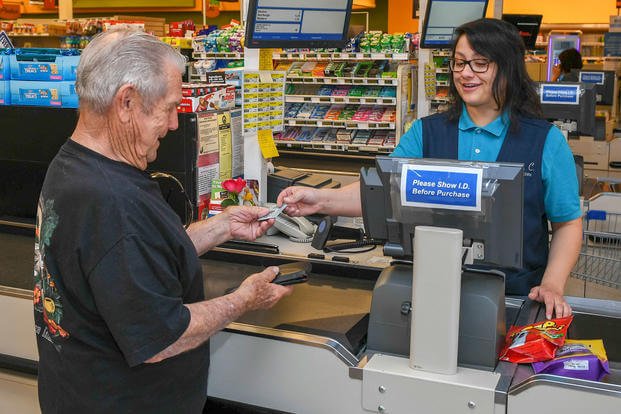While some newly eligible veterans and caregivers were welcomed by commissaries and exchanges with cake and balloons, several others were met with surprises on some base guest policies.
More than 4 million veterans and caregivers became eligible this year to shop at commissaries, exchanges and MWR facilities. Details on how veterans would be identified for the benefit and permitted on secure bases to access these facilities were not released until a few months before implementation.
While the Department of Defense said each branch is training its Visitor Control Center staff, some newly eligible patrons have reported they were told they could not bring a guest with them.
Related: Some New Commissary Shoppers Will Be Able to Use This Letter for Base Access
"My husband and I have absolutely no problem with following these rules, regulations, or the processing of this as a spouse," wrote one reader who was denied at Joint Reserve Base Fort Worth. "But to be told that it is not for me as a spouse is downright heartbreaking and discouraging and not right to us. Especially since I served along beside my husband during all of those years of enlistment."
But base staff said last-minute changes in the policy led to confusion for Visitor Control Center staff, and there has been some miscommunication as bases have tightened security in the wake of threats from Iran.
"The employees at the VCC did not understand the new policy, as there were several changes made from the Dept of Veterans Affairs, concerning this issue," said Joint Reserve Base Fort Worth spokeswoman via email. "However, they have been retrained on the current policy, and will no longer turn away guest and family members of VHIC holders."
One reader showed a sign posted in the Naval Base San Diego's VCC that concluded in a note to veterans, "Your ID does NOT give you escort privileges."
The base spokeswoman in San Diego explained the installation has suspended its "Trusted Traveler" program for all personnel, and it has caused "some confusion with veterans" because the suspension means they can't bring a guest.
She added the sign did not specify that, because they don't know how long the program will be suspended.
A DoD spokeswoman said if a base does not let a veteran or caregiver bring a guest with them to shop, they should consider checking back later to ask why entry was refused, and request an appeal under DODM 5200.08 Volume 3.
"As there could be several reasons for restricting access to the installation, even for authorized personnel, should a guest be refused entry to an installation, veterans and caregivers should respectfully comply with the direction by installation access personnel," she said via email.
Congress granted Purple Heart recipients, former prisoners of war, veterans with any service-connected disability and caregivers registered with the VA's Comprehensive Assistance for Family Caregivers program eligibility to shop at commissaries and exchanges on Jan. 1. Details on this policy can be found here.
-- Dorothy Mills-Gregg can be reached at dorothy.mills-gregg@military.com. Follow her on Twitter at @DMillsGregg.
Read More: Russia Ship 'Aggressively' Approached Navy Destroyer, Officials Say













